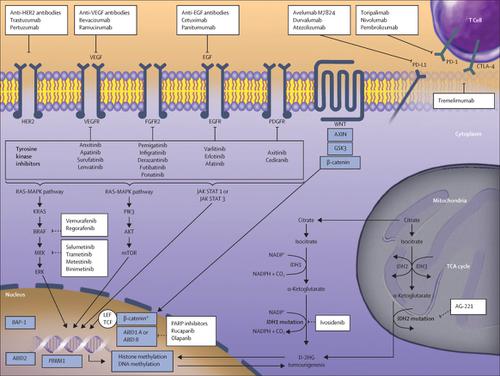当前位置:
X-MOL 学术
›
Lancet Oncol.
›
论文详情
Our official English website, www.x-mol.net, welcomes your
feedback! (Note: you will need to create a separate account there.)
Second-line therapies in advanced biliary tract cancers.
The Lancet Oncology ( IF 41.6 ) Pub Date : 2020-01-01 , DOI: 10.1016/s1470-2045(19)30733-8 Sri Harsha Tella 1 , Anuhya Kommalapati 2 , Mitesh J Borad 3 , Amit Mahipal 4
The Lancet Oncology ( IF 41.6 ) Pub Date : 2020-01-01 , DOI: 10.1016/s1470-2045(19)30733-8 Sri Harsha Tella 1 , Anuhya Kommalapati 2 , Mitesh J Borad 3 , Amit Mahipal 4
Affiliation

|
Biliary tract cancers constitute approximately 3% of gastrointestinal malignancies with poor prognosis. Surgical therapy is the main form of treatment in localised disease; however, for patients with advanced stage or unresectable disease, locoregional and systemic chemotherapeutics are primary treatment options. Although the combination of gemcitabine and cisplatin is a standard regimen of choice, there are no consensus guidelines that help in choosing an appropriate second-line therapy. Substantial progress has been made in the past decade to understand the tumorigenesis and genetic landscape of each biliary tract cancer subtype, which facilitates precision medicine for this cancer. Common genes implicated in biliary tract cancer tumorigenesis include IDH1, IDH2, FGFR1, FGFR2, FGFR3, EPHA2, BAP1, ARID1B, ELF3, PBRM1, PRKACA, PRKACB, HER2, and BRAF. With the advancements in molecular pathogenesis of biliary tract cancer, especially in an era of personalised medicine, many questions are yet to be answered in advanced stages of the cancer: what subset of patients might benefit from second-line drugs, how to choose an optimal second-line regimen, and their effects on quality of life. This Review seeks to summarise available literature and discuss the potential second-line systemic therapy options for advanced biliary tract cancer on the basis of advancements of our knowledge on molecular pathogenesis and tumorigenesis.
中文翻译:

晚期胆道癌的二线治疗。
胆道癌约占胃肠道恶性肿瘤的3%,预后较差。手术治疗是局部疾病的主要治疗形式。但是,对于晚期或无法切除的疾病,局部和全身化疗是主要的治疗选择。尽管吉西他滨联合顺铂是标准的治疗方案,但尚无共识指南可帮助选择合适的二线治疗。在过去的十年中,在了解每种胆道癌亚型的肿瘤发生和遗传情况方面已经取得了实质性进展,这促进了对该癌症的精确治疗。与胆道癌发生有关的常见基因包括IDH1,IDH2,FGFR1,FGFR2,FGFR3,EPHA2,BAP1,ARID1B,ELF3,PBRM1,PRKACA,PRKACA,HER2,和BRAF。随着胆道癌分子发病机制的发展,特别是在个性化医学的时代,在癌症的晚期阶段仍有许多问题尚待解答:哪些患者可能从二线药物中受益,如何选择最佳的二线疗法及其对生活质量的影响。这篇综述旨在总结现有文献,并根据我们对分子发病机理和肿瘤发生的认识,探讨晚期胆道癌的潜在二线全身治疗方案。如何选择最佳的二线治疗方案及其对生活质量的影响。这篇综述旨在总结现有文献,并根据我们对分子发病机理和肿瘤发生的认识,探讨晚期胆道癌的潜在二线全身治疗方案。如何选择最佳的二线治疗方案及其对生活质量的影响。这篇综述旨在总结现有文献,并根据我们对分子发病机理和肿瘤发生的认识,探讨晚期胆道癌的潜在二线全身治疗方案。
更新日期:2020-01-04
中文翻译:

晚期胆道癌的二线治疗。
胆道癌约占胃肠道恶性肿瘤的3%,预后较差。手术治疗是局部疾病的主要治疗形式。但是,对于晚期或无法切除的疾病,局部和全身化疗是主要的治疗选择。尽管吉西他滨联合顺铂是标准的治疗方案,但尚无共识指南可帮助选择合适的二线治疗。在过去的十年中,在了解每种胆道癌亚型的肿瘤发生和遗传情况方面已经取得了实质性进展,这促进了对该癌症的精确治疗。与胆道癌发生有关的常见基因包括IDH1,IDH2,FGFR1,FGFR2,FGFR3,EPHA2,BAP1,ARID1B,ELF3,PBRM1,PRKACA,PRKACA,HER2,和BRAF。随着胆道癌分子发病机制的发展,特别是在个性化医学的时代,在癌症的晚期阶段仍有许多问题尚待解答:哪些患者可能从二线药物中受益,如何选择最佳的二线疗法及其对生活质量的影响。这篇综述旨在总结现有文献,并根据我们对分子发病机理和肿瘤发生的认识,探讨晚期胆道癌的潜在二线全身治疗方案。如何选择最佳的二线治疗方案及其对生活质量的影响。这篇综述旨在总结现有文献,并根据我们对分子发病机理和肿瘤发生的认识,探讨晚期胆道癌的潜在二线全身治疗方案。如何选择最佳的二线治疗方案及其对生活质量的影响。这篇综述旨在总结现有文献,并根据我们对分子发病机理和肿瘤发生的认识,探讨晚期胆道癌的潜在二线全身治疗方案。











































 京公网安备 11010802027423号
京公网安备 11010802027423号